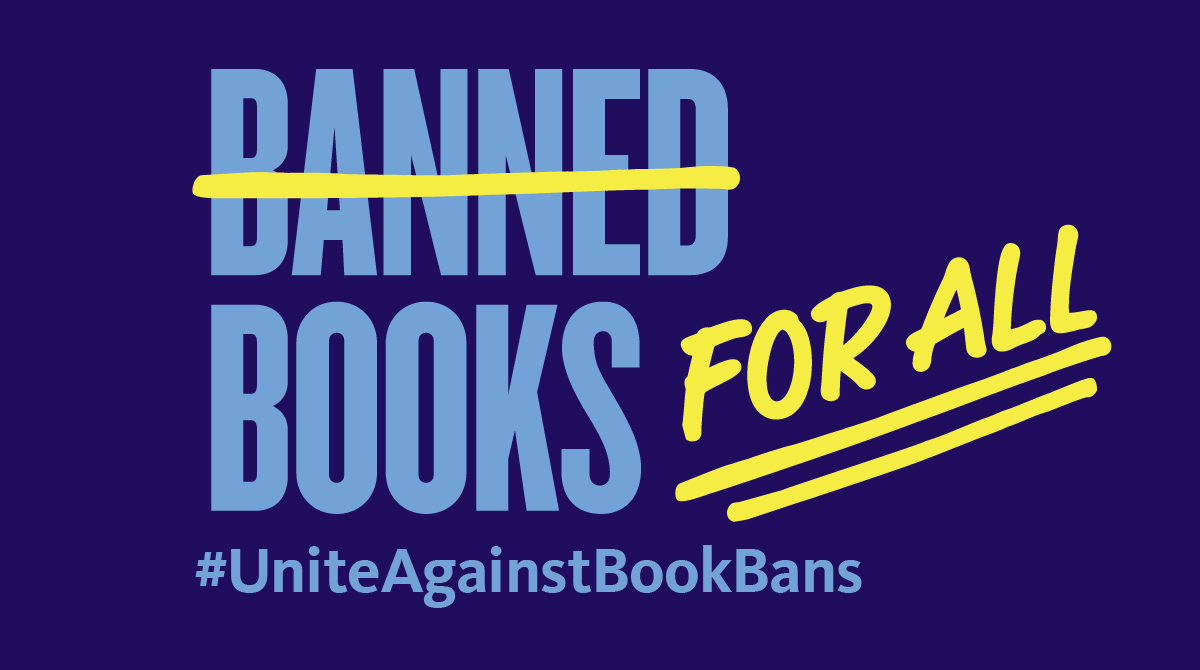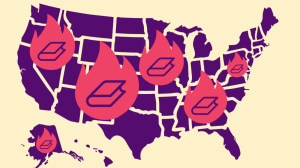Fight Censorship
Libraries and schools across the country are experiencing unprecedented levels of attempts to ban or remove books from their shelves. The American Library Association documented 4,240 unique titles that were targeted for censorship in 2023, a stratospheric increase over the previous year's record-shattering number. Nearly half of the challenged titles represent the voices and lived experiences of LGBTQIA+ and BIPOC individuals.
But that's only part of the story. According to ALA's Office for Intellectual Freedom, challenges in public libraries soared by 92% over the previous year. Nearly half of book ban attempts took place in public libraries in 2023.
"The reports from librarians and educators in the field make it clear that the organized campaigns to ban books aren’t over, and that we must all stand together to preserve our right to choose what we read" - Deborah Caldwell-Stone, director of ALA's Office for Intellectual Freedom
It's up to all of us to fight back against censorship. Read on for ways you can get involved to defend the freedom to read in your community.

Join the Unite Against Book Bans Campaign
Unite Against Book Bans is a national initiative to empower readers everywhere to stand together in the fight against censorship. The website contains a full toolkit of free resources to help your community counter efforts to ban books. Sign up to receive updates and action alerts. Every person who joins the campaign is one more voice to speak out when their community is threatened by censorship.

BOOKS FOR ALL
The New York Public Library and the American Library Association are partnering to invite libraries, school groups, and readers across the country to participate in Books for All—a national initiative to help communities learn about and discuss some of the books that are being banned or challenged, along with ways to take action.
Show Up for Your Library and Library Workers
Most book ban battles are being fought on the local level at library board, school board, and city council meetings. That makes attending these meetings one of the most critical actions you can take to fend off book bans.
Make sure local officials know you trust librarians and library workers and support the library and access to books of all kinds by attending, listening, and speaking out against censorship. Speak as a community stakeholder who supports a parent's right to restrict reading materials for their own child but not for all readers.
Report Censorship
As part of its longstanding commitment to defend intellectual freedom in libraries, the American Library Association maintains a database of attempted challenges and bans. If a book challenge takes place in your district, ALA may be able to provide support and more customized resources to oppose the attempted challenge or ban. Reports are confidential unless you give ALA permission to share your story.
Write a Letter to Media or Officials
Make your voice heard by submitting a letter to the editor of your local newspaper or writing directly to your elected officials. Don't worry: no postage required. You can do it all online.
Writing a letter to the editor of your local newspaper is great way to elevate your voice in the conversation around book bans. Similarly, public input is very important for school and library board members, trustees, and local and state legislators, especially when opposing new policies or legislation that would censor materials, programs, or curriculum, or punish educators for simply doing their jobs of providing access to information.
Check out the resources at the Unite Against Book Bans website, including talking points and example letters, to help you craft your message.

Read a Banned or Challenged Book
Knowing why a book is controversial is critical when defending it from a being banned, which makes reading it all the more important.
But beyond that, libraries track a lot of statistics, including how frequently books are used in or checked out from the library, or requested via a library lending program like interlibrary loan (ILL). These circulation statistics prove that people want to read these challenged titles and support keeping them in, or adding similar titles to, the collection.
Browse the ALA's list of Frequently Challenged Books, find one that interests you, and check it out from your library! If they don't have it, request it via ILL and ask that your library purchase a copy. And if the book is already checked out, request that a hold be placed for you for when the book returns.
If You're Able, Consider Donating
The ALA's LeRoy C. Merritt Humanitarian Fund supports librarians and library workers facing employment discrimination for defending intellectual freedom. With library workers facing threats to their livelihoods and harassment for simply doing their jobs, there's never been a greater need.
Learn more about the value of America's libraries.
As great democratic institutions, libraries serve people of every age, income level, ethnicity, and ability, providing the full range of information resources needed to live, learn, govern, and work. Learn more.
School libraries need your support.
In too many schools, school library budgets and school librarian positions are being cut. This puts our children’s education and work- force readiness at peril. Learn more.
Spread the Word with Merch
Show the world that you oppose book bans and support the freedom to read with official merchandise from the American Library Association. Show now.
Subscribe to the I Love Libraries newsletter for library news and advocacy updates.
Support I Love Libraries and our efforts to promote the value of libraries and librarians.



